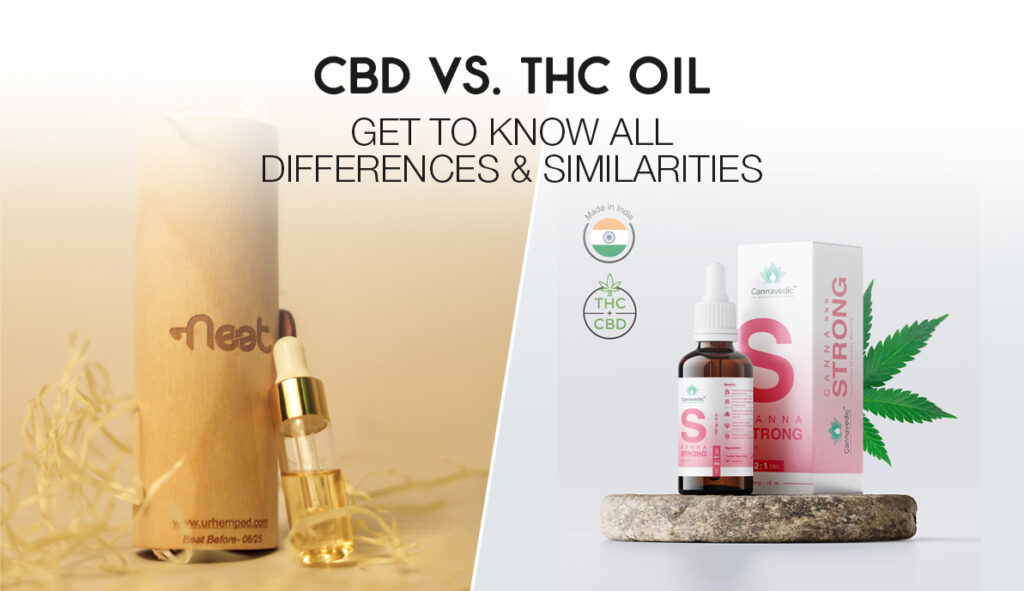
CBD vs. THC Oil: Get To Know All Differences & Similarities
This article helps you understand the comparison between CBD Vs. THC Oil.
A recent surge in the popularity of CBD and THC has raised the need among individuals to grasp the difference between the two. Individuals find it hard to decide between the two oils choosing which among the two is the better one. Despite having similar structures, their interactions with receptors are unique. It is essential for anyone considering buying CBD or THC oil for medical or recreational purposes to learn the differences as well as similarities between the two varieties of oil.
Brief About CBD
Among more than 100 cannabinoids present in cannabis, CBD has drawn a lot of attention with its potential therapeutic benefits without the intoxicating “high” linked to THC. CBD is a type of cannabis that contains less THC, making it legal in many places of the world. CBD is primarily used to produce CBD oil.
CBD oil may be useful in treating a variety of conditions, such as anxiety, chronic pain, inflammation, and seizures. It is believed that CBD interacts with the body’s endocannabinoid system, which is essential for controlling brain response, mood, sleep, and appetite. It’s crucial to remember that even though a lot of people have had good experiences with CBD, more research is necessary to completely grasp both its potential benefits and drawbacks.
THC Oil: Overview
THC stands as the chief psychoactive component found in cannabis, accountable for the euphoric high often linked to marijuana consumption. Extracted from cannabis varieties boasting elevated THC levels, the oil induces a spectrum of effects on both the psyche and physique, encompassing relaxation, time and space perception, heightened appetite, and intensified sensory encounters.
In addition to its recreational effects, THC comes with a therapeutic potential, notably in alleviating pain, nausea, and muscle spasms. Across different regions, medical marijuana initiatives have sanctioned the use of THC-infused remedies for eligible patients grappling with specific health issues. Yet, the psychoactive nature of THC may prove unwelcome for certain individuals, resulting in impairment and cognitive changes.
Key Differences and Similarities
1. Mind Effects: CBD and THC oil are different mainly because of how they affect your mind. CBD might not make you feel high, but THC may, making you feel happy and changing how you think.
2. Pharmacological Effects: CBD and THC both have a different interaction with neurotransmitter systems in our body, resulting in different pharmacological effects. While CBD offers a multitude of properties, including antioxidant, neuroprotective, and anti-inflammatory properties, THC on the other hand, activates cannabinoid receptors to stimulate its psychoactive effects. Hence, these both contribute to pharmacology and efficiency in the human body in different ways.
3. Side Effects: CBD is usually okay for most people, but a slight proportion of individuals experience side effects which are common for a first time user. THC, though, is believed to cause minimal or no side effects due to the efficacy of the compound.
Forms and Ways to Take
There are various alternative forms and methods of consumption available for both cannabinoids, catering to diverse preferences and needs.
CBD Products
You can buy cannabis oil India in a multitude of forms, offering versatility and convenience for consumers. Some popular options include:
1. Tincture: CBD oils, also called tinctures, are among the most popular and adaptable CBD products. They usually come in small bottles with a dropper, letting you measure out doses precisely. You can take the oil under your tongue for quicker absorption or mix it into food and drinks.
2. Gummies: CBD gummies are available in multiple flavours and are quite popular for their ease of consumption and taste.
3. Pills: CBD capsules are a handy choice for those who like having a set dose of CBD. Like regular supplements, you swallow these capsules, making it simple to add CBD to your daily routine.
4. Skin Products: CBD-infused skin products like creams and lotions are made to target specific areas of discomfort or skin issues. You apply these products directly to your skin, letting the CBD work with the cannabinoid receptors in the area without entering your bloodstream.
THC Products
THC is also consumed in multiple forms with a range of options for medicinal use. The most common forms of THC products include:
1. Oils: Similar to CBD oils, these oils or concentrates are highly potent extracts that can be used in vaporizers or dab rigs for inhalation. These concentrated forms of THC offer rapid onset effects and precise dosing for experienced users.
2. Tinctures: THC tinctures are liquid extracts that can be consumed sublingually or added to food and beverages. They provide a discreet and convenient way to administer THC, with effects typically felt within minutes.
3. Edibles: THC-infused edibles, such as brownies, cookies, chocolates, and gummies, offer an alternative to smoking or vaping for those who prefer oral consumption. Edibles provide a longer-lasting and more intense high compared to inhalation methods, but onset can be delayed, requiring patience and mindful dosing.
Takeaway!
In conclusion, buyers should take into account the potential advantages and drawbacks of THC and CBD oils. While THC has both medical and recreational uses in addition to its psychoactivity, CBD is more appealing to individuals looking for treatment without adverse effects. People should use cannabis with caution and be aware of the possible risks and advantages connected with each. It is advisable to consult with a doctor or health professional, especially if you want to buy cannabis-based oil for medical conditions.
